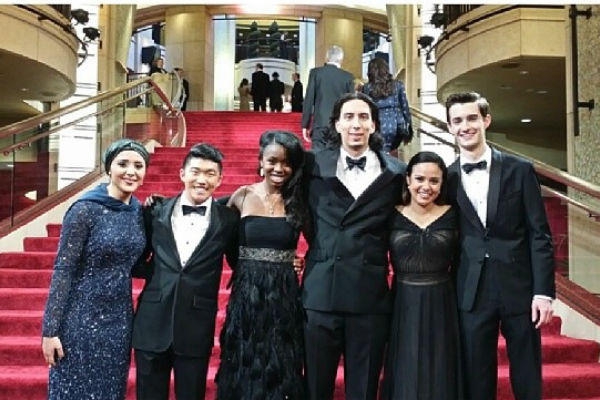 Zaineb Abdul-Nabi made history during the 2014 Oscars as the first American-Muslim woman to wear a hijab on the red carpet and on stage at the awards. One writer points out that it is her work in film that should define her, and not her head covering.
Zaineb Abdul-Nabi made history during the 2014 Oscars as the first American-Muslim woman to wear a hijab on the red carpet and on stage at the awards. One writer points out that it is her work in film that should define her, and not her head covering.When Zaineb Abdul-Nabi made an appearance on�the Oscars� red carpet and stage last weekend, my Twitter and Facebook feeds erupted with surprised and thrilled comments.
�Wow there�s a hijabi on The Oscars� stage! Represent!�
�Hijabi Oscars presenter FTW!�
�Hijabi love! Beautiful Muslim woman representing at The Oscars!�
Ms. Abdul-Nabi, a 22 year-old-from the Bronx, N.Y., who is a student at the University of Michigan, was selected as one of six students who won the��Team Oscar��national film competition.
Thousands of college students submitted short videos along with an essay demonstrating how they plan on contributing to the film industry.
Abdul-Nabi�s�video�is less than a minute long, but clearly highlights her hard work, creativity, and promise as an upcoming filmmaker.
Her choice of background music, the eclectic scenes and faces in the video, and her narration on her drive and ambition are uplifting and powerful.
Indeed, it is wonderful and exciting that a Muslim woman, who happens to wear the hijab, won this competitive process and is possibly the first �hijabi� to ever walk the Oscar stage. And yes, she looked nothing short of radiant on the red carpet, and spoke thoughtfully in her interview with Robin Roberts.
But why is there such a fixation on her attire and the hijab she dons? Some went so far as to suggest that she merely won because of her hijab and that this was a classic case of Hollywood�s selective tokenizing.
But doing so invalidates Abdul-Nabi�s accomplishments and reduces her notable talent. On Twitter and Facebook, I watched many of her friends reply to comments by giving name to Abdul-Nabi. They were quick to identify her as �Zaineb, the talented and hardworking filmmaker� rather than the nameless hijabi so many wanted to claim.
Can we please get over the whole �first hijabi, Muslim woman to do such and such� trend in the media and elsewhere? Can we focus more on these women�s achievements, hard-work, skills, and contributions rather than what they are wearing?
There is no correlation between a person�s hijab and talent-level. Whether to celebrate or dismiss, we must resist the urge to focus only on the hijab, as doing so disregards one�s talents. It is easy, I know, when certain groups have been excluded and made nearly invisible for so long, but to show actual support, begin by learning peoples� names and what got them to where they are.
American Muslim women have been essential contributors to their communities in all sorts of ways � whether as teachers, filmmakers, doctors, community organizers, and so on. They go through everyday struggles and are often�discriminated against�because of their identities.
Yes, showing support for them is essential, but let�s not undermine the work they have been doing for a long time by brushing aside their talent and suggesting that their biggest accomplishment in their field is their identity or being first, rather than the quality of their work.
I asked Abdul-Nabi about her remarkable experience and she said it was an honor to be at the Oscars.
Although now her work is on the technical side of filmmaking, she hopes one day she will be producing or writing films.
Her passion, she said, is highlighting �ordinary� people who are often misrepresented in the media.
�In a sense, I get it is a big honor: a big honor as a woman of color, a Muslim woman, and an Arab woman. It�s a counter-cross part of my identity, so when people single it out on Twitter, I don�t find it shocking � it�s only one part of my identity people choose to highlight,� she said. �At the end of the day, I know it�s not my hijab or color that represent me. All of those things aren�t solely what makes me who I am. It�s up to me the way I choose to combat those labels.�
By The Christian Science Monitor
The Iran Project is not responsible for the content of quoted articles.











